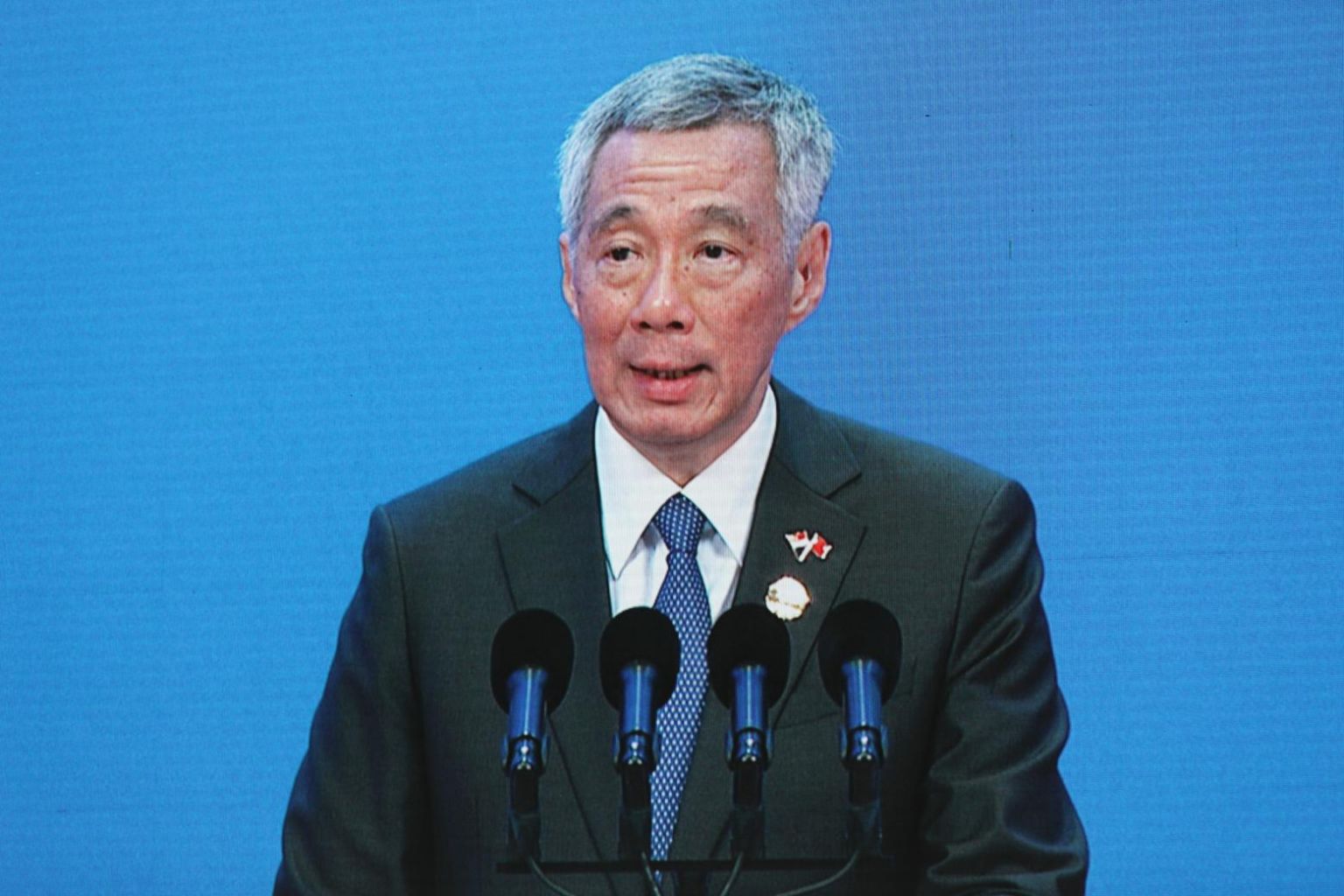Trade war would disrupt Sino-US ties, with catastrophic consequences for the world: PM Lee
Sign up now: Get ST's newsletters delivered to your inbox

Prime Minister Lee Hsien Loong speaking at the opening plenary session of the Boao Forum for Asia, an annual meeting of top executives and leaders, on April 10, 2018.
PHOTO: LIANHE ZAOBAO
Follow topic:
BOAO, HAINAN - It is in China's fundamental interests to continue to contribute to strengthening multilateralism at this testing moment when it seems to be on the brink of a trade war with the United States, Prime Minister Lee Hsien Loong said.
This is because if trade tensions erupt into a full-scale trade war it could damage US-China ties in many areas and cause catastrophic consequences for the world, said PM Lee on Tuesday (April 10) at the Boao Forum for Asia, an annual meeting of top executives and leaders.
"China and the US have the most important bilateral relation in the world," said PM Lee, adding that a trade war would make it difficult for both countries to cooperate in other areas such as climate change, nuclear non-proliferation, regional security and denuclearisation of the Korean Peninsula.
"None of these issues can be solved without the full participation of both countries, and if disputes escalate and destabilise US-China relations the consequences for the world could be catastrophic," he said.
In recent weeks, the US has threatened to impose tariffs on Chinese imports, in a bid to protect domestic industries and reduce bilateral trade deficits. China responded, revealing a list of US imports that it intends to impose tariffs of its own.
This sabre-rattling between the two economic superpowers has roiled global markets and stoked fears of an impending trade war.
Speaking at the opening plenary of the annual forum, held on China's southern Hainan island, PM Lee said he was confident that China would handle this challenge well, safeguard its interests and keep the global system open and inclusive.
"In international affairs, one of China's strengths has always been its ability to take a strategic, long-term view. It is in China's fundamental interests to contribute more to strengthening multilateralism, in keeping with its larger weight in the world," said PM Lee.
"And it is vital that China does so now, at this testing moment in international relations."
He added that while there would always be competition between major powers, it made "all the difference whether competition takes place within a framework of interdependence, and generally accepted rules of the game".
"Because what is ultimately at stake is war and peace, the security and stability of the world," he said.
China's response to the US' unilateral tariffs have so far been careful and calibrated but Mr Lee added that the world is hoping both parties would be able to work out an accommodation and head off further escalation before tariffs are implemented.
"Singapore does not believe that imposing unilateral tariffs is the correct solution. First of all, unilateral measures are not compliant with World Trade Organisation (WTO) rules," he said, adding that trade disputes should be resolved within the WTO framework.
He also noted economists have pointed out that the focus on bilateral trade imbalance between the US and China is misplaced, adding that what matters was not bilateral trade balances with specific partners, but a country's overall trade balance with the world.
"The cause of a trade deficit is an imbalance in the domestic economy, in particular when a country consumes more than it produces," he said.
PM Lee was among world leaders who delivered an impassioned defence of the global trading order at the opening plenary of the annual forum. He arrived in China on Sunday for a five-day working visit.
But PM Lee also noted that there was broad political support in the US for imposing tariffs against China.
This was probably because US firms that previously advocated for China when it joined the WTO in 2001 now feel disadvantaged due to the perceived unfair playing field in terms of market access or investment restrictions.
PM Lee called on China to liberalise its markets further and contribute more to the multilateral trading system, in line with its larger role in the global economy.
Only if countries remained open and connected to one another, holding on to the multilateral WTO system as a basis for trade, would Asia's economic dynamism be sustained, he said.
He added that it was reassuring that most Asia-Pacific countries remained committed to multilateral trade, pointing to the Comprehensive and Progressive Agreement for Trans-Pacific Partnership trade pact, and negotiations for the Regional Comprehensive Economic Partnership.
"These trade initiatives are important, but they will not compensate for the damage from a trade war, which will extend way beyond the economic loss that they will cause," said PM Lee.
This is the first time PM Lee is attending the Boao Forum, billed as China's answer to the World Economic Forum in Davos, Switzerland.
Other foreign leaders including Philippine President Rodrigo Duterte, Dutch Prime Minister Mark Rutte and Pakistan's Prime Minister Shahid Khaqan Abbasi also attended the forum.
PM Lee is leading a Singapore delegation in China for a working visit. Before attending the Boao Forum, he had been in Beijing where he met top Chinese leaders.
He will leave Hainan on Tuesday after the Boao Forum for Shanghai, the last leg of his five-day visit.

